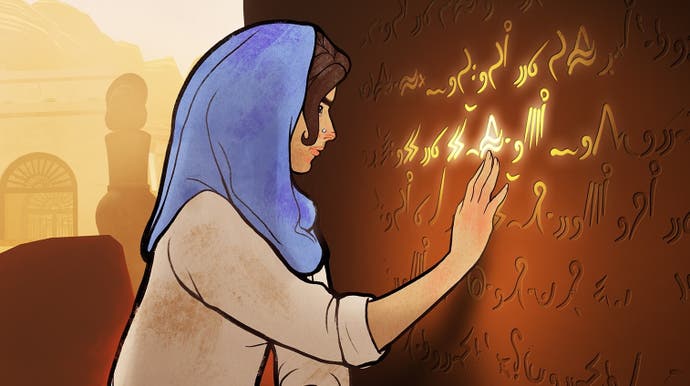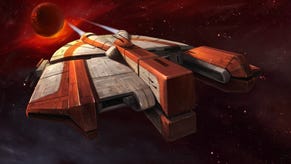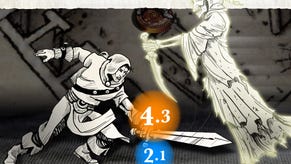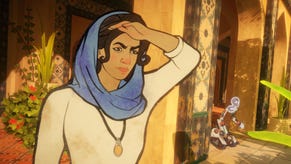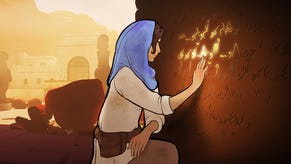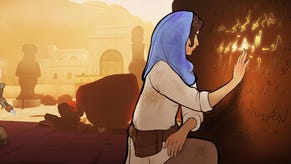80 Days developer Inkle is on fine form in Heaven's Vault
Word.
Heaven's Vault doesn't look like much to begin with. It feels simple and sparse. The graphic novel idea - illustrated 2D characters in a rendered 3D world - sounds nice, but the combination of characters being only partially animated, moving from still-pose to still-pose, and the environments being basic, feels awkward and, to be brutally honest, a bit cheap. There's nothing - no cinematics, barely a voice over - to grab you. Yet, from the moment Heaven's Vault began, I was gripped.
It's the words: Heaven's Vault wields them masterfully, knowing exactly when to use them. At the outset you're simply told, by an odd-looking robot - a sort of hologrammed face on top of a bomb-disposal unit - you are urgently required. No exposition, no "you are here because..." - just an order. It's very effective! You follow because you want to know more. You can tease information along the way, by questioning or remarking, but no one ever turns and explicitly spells things out. There are no forced conversations. You are only ever told what is appropriate in the moment.
Backstory is tidied away for when you want it, recorded onto a timeline. Everything from what happened five minutes ago, to what happened 30 years ago, can be seen there. Want to know about your first kiss? It's there. Want to know about your past with a notable character? It's there, and it keeps it neatly out of the main story's flow.
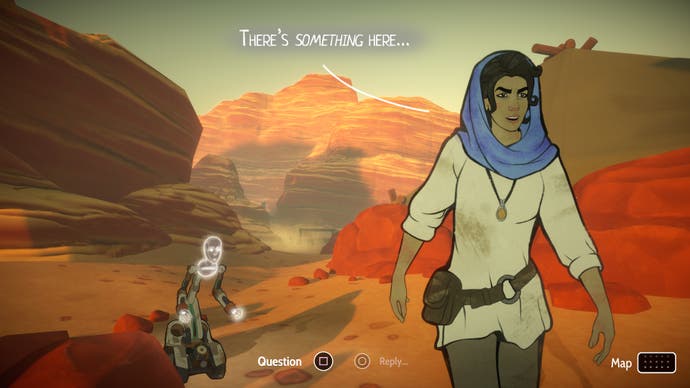
Speech itself appears as if in a graphic novel, both deliberately placed and paced, and it has a spoken rhythm. For example: "Did I do something wrong?" enquires Aliya, the protagonist, at one point. "You came here," her companion robot Six replies. Then the line fades. And then, Six adds, "Maybe that is all." It's not much - a touch so understated as to be almost invisible - but it has a powerful dramatic effect.
Words, then, are what drives Heaven's Vault, but they're also what Heaven's Vault is about. You play Aliya, a roguish kind of explorer-historian, sailing space looking for historical artifacts while she tries to piece together an ancient language. So, yes, it's science-fiction, but it's a Middle-eastern and low-tech kind of setting, all baking sun and sand, and it's very refreshing for it.
It's the meaning behind a brooch, given by an old friend (of sorts), which kicks off your adventure. It has an inscription on it but what does it mean? This kind of language decryption is central to Heaven's Vault. Every time you're faced with an inscription - or engraving or embroidery - you can try and translate it.
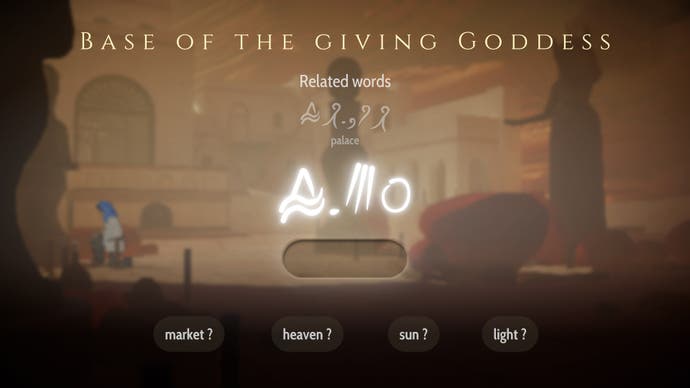
You see the word you want to translate with an empty box underneath, and into that box you can put one of a few words chosen by the game. You don't know much about the ancient language to begin with - either you personally or Aliya - but as you gather more examples of it, your understanding grows in tandem. You personally begin to recognise what words may mean and understand how the language works, while Aliya begins to confirm some of your guesses, and so your lexicon grows.
Otherwise, broadly, Heaven's Vault is a point-and-click. You move on set paths around environments, accompanied by your robot Six. Six provides someone - something - to bounce off, and a handy vehicle for the game to tell you things you need to know.
Ironically, for a machine, Six also provides a lot of heart - in much the same way a Star Wars droid can. Its naturally naive and emotionless way of doing things gives rise to amusing conversations, particularly as Aliya hates robots, and every so often Six 'accidentally' (for I'm sure the developers mean it) stumbles on something quite profound. I really liked "Hope is a mathematical certainty", and I wouldn't be surprised if, later on, Six is revealed to play a deeper-than-realised role.
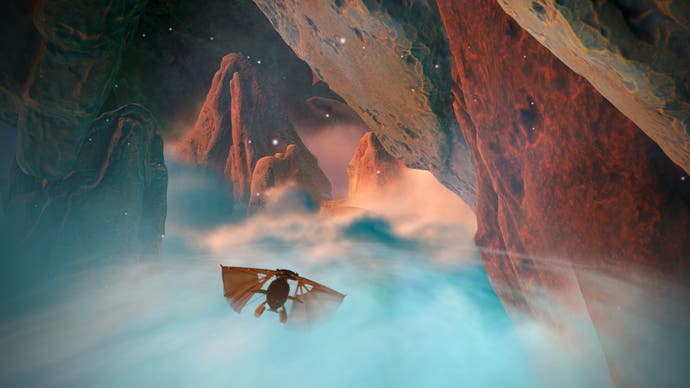
In between, there's sailing - or flying depending on how you look at it. You ride space streams (think ocean currents) in a little ship, and plot your routes by them. It's not very demanding - you move left and right to dodge rocks, and pull sails in to steer onto other streams - but it's pretty-enough, breaks up the on-foot sections, and reinforces a sense of scale and exploration.
Gradually, Heaven's Vault sinks in. The way the illustrated characters annotate the story, with a kind of paired back grace rather than gaudy showmanship, grows on you, and what you felt was once emptiness, evolves into an appreciation of a game given space to breathe. Your having fewer in-game distractions means Heaven's Vault can be subtle and sophisticated in how it tells you things. It can plant intrigue and leave it naturally to sprout. It can do less to do more.
So it might not look like much to begin with, but behind it is the unmistakable confidence of a developer on fine form. And a very talented developer. A developer which has proven, in 80 Days and Sorcery!, it can make outstanding word-based games. It might be the studio's first foray onto console, Heaven's Vault, but everything I've seen suggests it's perfectly at home here. This is one to keep an eye on and, fortunately, there's not long to wait.
